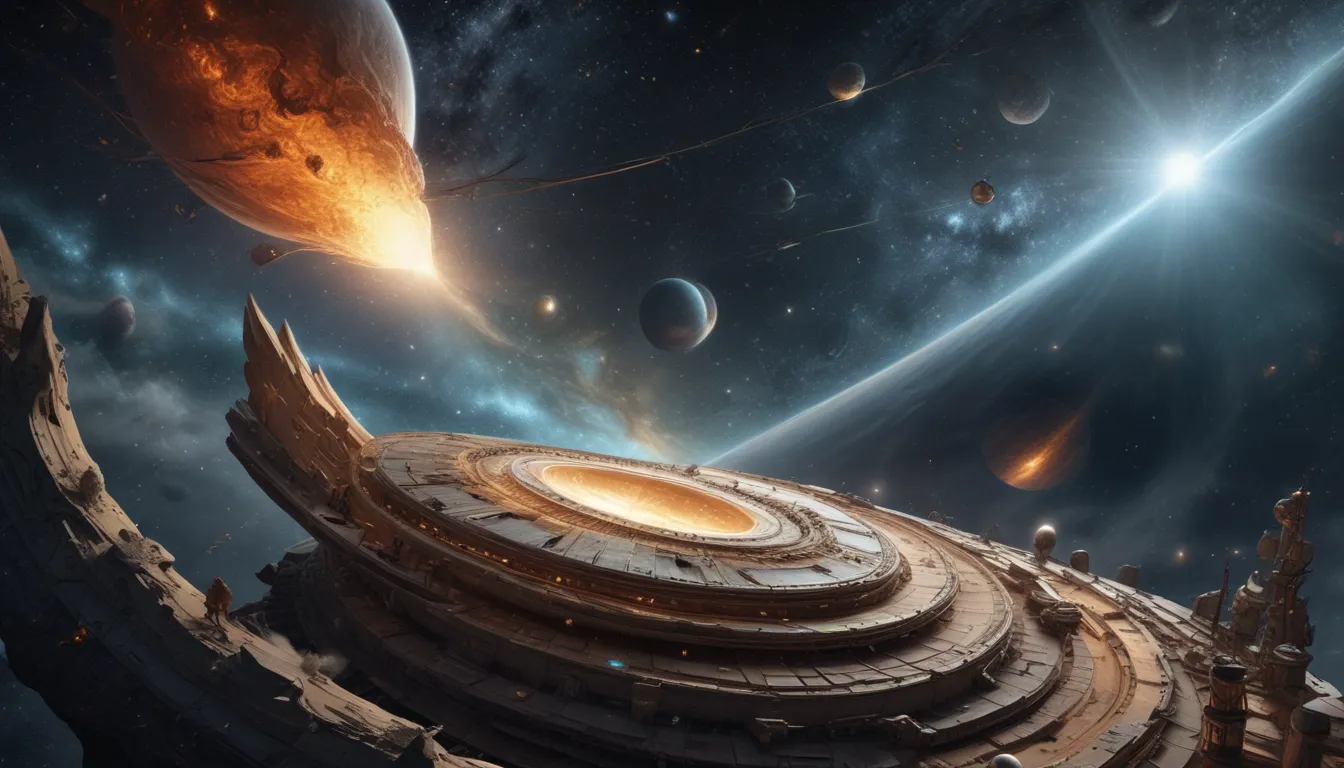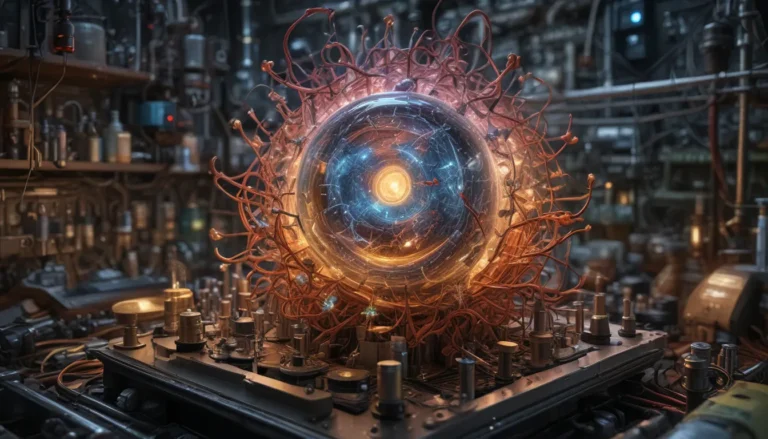A Note About Images: The images used in our articles are for illustration purposes only and may not exactly match the content. They are meant to engage readers, but the text should be relied upon for accurate information.
Cosmology, the scientific study of the universe at large, is a captivating field that continually evolves, offering insights into the origins, structures, and destiny of our cosmos. From groundbreaking theories to awe-inspiring discoveries, cosmology sparks the imagination of scientists and enthusiasts alike. In this article, we will unravel 12 extraordinary facts about cosmology that illuminate the fascinating nature of our universe, taking you on a journey through space and time.
The Big Bang Theory: A Cosmic Genesis
The Big Bang Theory stands as the cornerstone of cosmology, explaining the universe’s birth from a tiny, hot singularity that rapidly expanded, giving rise to everything we know today. The concept of a cosmic explosion that ignites the creation of galaxies, stars, and planets provides a profound insight into our cosmic origins.
The Expanding Universe: Witnessing Cosmic Growth
Edwin Hubble’s groundbreaking observations in the 1920s revealed the concept of an expanding universe, with galaxies moving away from each other in a continuous motion. This discovery shattered the notion of a static universe, paving the way for our understanding of the dynamic and evolving nature of the cosmos.
Dark Matter: Unveiling the Invisible Enigma
Dark matter, comprising about 27% of the universe, remains an intriguing mystery. Despite its invisible nature, dark matter’s gravitational effects on visible matter provide compelling evidence for its existence, challenging scientists to unravel its enigmatic properties.
Dark Energy: The Driving Force of Cosmic Expansion
Constituting approximately 68% of the universe, dark energy exerts a mysterious force that accelerates the expansion of the cosmos. Balancing the gravitational pull of matter, dark energy propels galaxies apart, fueling the universe’s ongoing expansion.
Black Holes: Gravity’s Unyielding Dominion
Black holes, born from the remnants of massive stars, exert an intense gravitational pull that engulfs everything, including light. These cosmic behemoths act as celestial vacuum cleaners, devouring any matter that ventures too close to their event horizons.
Cosmic Microwave Background Radiation: Echoes of the Big Bang
The cosmic microwave background radiation, discovered in 1964, serves as a relic of the Big Bang, emitting a faint glow that echoes the universe’s early stages. This radiation provides substantial evidence supporting the Big Bang theory and offers valuable insights into the universe’s formative moments.
Inflation: The Rapid Expansion of the Universe
Inflation theory posits a brief period of exponential expansion following the Big Bang, explaining the uniformity of the cosmic microwave background and the intricate structures observed in the universe today. This rapid growth spurt sheds light on the universe’s evolution and complexity.
Multiverse: Exploring Diverse Realities
The concept of a multiverse expands our understanding of the cosmos, suggesting the existence of parallel universes with distinct physical laws. This intriguing idea pushes the boundaries of cosmological exploration, prompting contemplation of the universe’s vast diversity.
Supermassive Black Holes: Guardians of Galaxies
Supermassive black holes, found at the cores of galaxies, wield immense gravitational forces, shaping galactic structures and influencing cosmic dynamics. With masses millions to billions of times that of the sun, these cosmic giants play a pivotal role in galaxy formation and evolution.
Quantum Entanglement: Intertwined Cosmic Connections
Quantum entanglement, a perplexing phenomenon in quantum physics, highlights the entwined nature of particles across vast distances. The instantaneous correlation between entangled particles challenges conventional notions of space and time, offering profound insights into the universe’s fundamental principles.
Neutron Stars: Cosmic Density Defied
Neutron stars, remnants of supernova explosions, exhibit staggering densities, with a teaspoon of material weighing millions of tons on Earth. These compact objects push the boundaries of our understanding of matter and gravity, showcasing the diverse wonders of the cosmos.
Stellar Nucleosynthesis: Forge of Cosmic Elements
Stellar nucleosynthesis, the process by which stars generate elements beyond hydrogen and helium, serves as a cosmic element factory. This transformative process shapes the universe’s elemental composition, yielding the building blocks necessary for life’s existence and evolution.
Embracing the Marvels of Cosmology
Cosmology captivates the imagination with its profound insights into the universe’s mysteries, pushing the boundaries of human knowledge and understanding. From mind-bending theories to groundbreaking discoveries, the realm of cosmology invites us to explore the extraordinary wonders of the cosmos, expanding our horizons and deepening our appreciation for the universe’s complexity and beauty.
Let the Cosmic Odyssey Begin
Embark on a cosmic adventure through the realms of cosmology, unraveling the enigmatic secrets of the universe and marveling at its vastness and intricacy. From the cosmic genesis of the Big Bang to the accelerating expansion driven by dark energy, the universe’s mysteries await your exploration. Join us as we delve into the awe-inspiring world of cosmology, where each discovery unveils new dimensions of cosmic wonder and expands our understanding of the grand tapestry of existence.
FAQs: Exploring Cosmology’s Intrigues
-
What is cosmology, and what does it study?
Cosmology is the scientific study of the universe’s origin, structure, and evolution, delving into the mysteries of space and time. -
How does the Big Bang theory explain the universe’s origins?
The Big Bang theory posits that the universe began from a highly dense and hot point, rapidly expanding to form galaxies, stars, and planets, shaping the cosmos as we know it. -
What role does dark matter play in the universe?
Dark matter, constituting a significant portion of the universe, exerts gravitational influence on visible matter, despite remaining invisible to direct observation, challenging scientists to unravel its enigmatic properties. -
How does dark energy impact the universe’s expansion?
Dark energy, a mysterious force, accelerates the expansion of the universe, countering the gravitational pull of matter and driving galaxies apart, shaping the cosmos at a cosmic scale. -
What is the significance of cosmic microwave background radiation?
The cosmic microwave background radiation serves as a relic of the Big Bang, offering crucial evidence supporting the universe’s early stages and the validity of the Big Bang theory, shedding light on the universe’s formative moments. -
Are multiple universes a possibility?
The concept of a multiverse raises the intriguing possibility of parallel universes with distinct physical laws, expanding our understanding of cosmic diversity and the vastness of the cosmos. -
How do supermassive black holes influence galaxies?
Supermassive black holes, present at the hearts of galaxies, wield immense gravitational forces, shaping galactic structures and influencing cosmic dynamics, playing a vital role in galaxy formation and evolution. -
What insights does quantum entanglement provide into the universe’s fundamental nature?
Quantum entanglement reveals the interconnectedness of particles across vast distances, showcasing the entwined nature of the universe at a quantum level, challenging conventional concepts of space and time. -
How does stellar nucleosynthesis contribute to the universe’s composition?
Stellar nucleosynthesis serves as a cosmic element factory, generating elements beyond hydrogen and helium, shaping the universe’s elemental diversity and providing the essential building blocks for life’s existence and evolution. -
Where does cosmology intersect with other scientific disciplines?
Cosmology overlaps with physics, astronomy, and astrophysics, incorporating principles and theories from these fields to deepen our understanding of the universe’s intricacies and complexities.
Onward into the Cosmic Unknown
The realm of cosmology beckons with its extraordinary revelations and mysteries, inviting us to explore the boundless wonders of the universe and expand our awareness of its grandeur. Delve into the marvels of the cosmos, journeying through the enigmatic realms of dark matter, dark energy, and cosmic phenomena that shape the universe’s tapestry. Uncover the astonishing secrets of the cosmos, ignite your curiosity, and embrace the awe-inspiring complexity and beauty of the universe that surrounds us.
Join the Cosmic Quest
Embark on a cosmic quest through the realms of cosmology, where extraordinary discoveries and profound insights await your exploration. From the cosmic origin of the Big Bang to the enigmatic forces of dark matter and dark energy, the universe’s mysteries beckon, challenging our perceptions and expanding our horizons. Join us as we venture into the awe-inspiring world of cosmology, where each discovery reveals new layers of cosmic wonder and enhances our appreciation for the universe’s infinite wonders.
The cosmos awaits your curiosity and wonder, inviting you to explore the vast expanse of space and time, unraveling the enigmatic mysteries that shape our universe and ignite our imagination. Let the cosmic odyssey begin, as we journey through the marvels of cosmology, expanding our understanding and embracing the infinite wonders of the cosmos.






